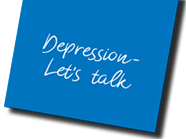Depression is a treatable illness
Getting treatment can be helpful for most people with depression since it is likely that depression will get worse if left untreated.
There are many effective treatments available to help people suffering from depression and many effective strategies that can be learned to cope and live with the illness. There are also many health professionals and services available to provide information, support and adequate specialised treatment.
Up to 80-90% of the people who receive treatment will feel better within just 3 to 8 weeks. Nevertheless, more than 70% of the people suffering from depression will not seek or receive appropriate treatment for a variety of different reasons. Many individuals will not seek help merely because they do not realise they are ill and do not recognise the signs or symptoms that something is wrong.
One of the most important reasons why people avoid treatment is stigma.
Stigma affects people’s ideas and beliefs on depression: some people believe that depression is nothing else but personal weakness or a character flaw. This is a serious mistake because like any other medical condition (such as diabetes, arthritis or hypertension), clinical depression is an illness that should be treated by a health care professional or a mental health professional.
It is important to learn about the various types of effective treatments available and how to access them.
The most important pillars of the treatment for depression are antidepressant medication (somatic treatment) and psychotherapy (psychological treatment).
You can learn more about these in the 'Treatment for Depression' section



